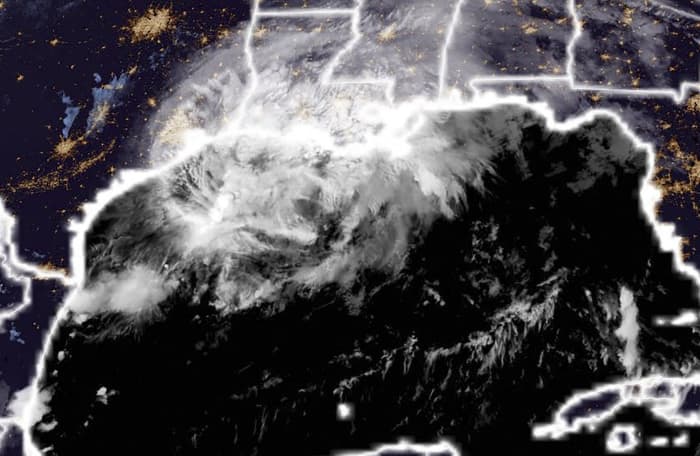#Living With Climate Change: Nicholas could bring catastrophic flooding to parts of Texas and Louisiana — what we know about climate change’s impact

Table of Contents
“#Living With Climate Change: Nicholas could bring catastrophic flooding to parts of Texas and Louisiana — what we know about climate change’s impact“

Tropical Storm Nicholas could “cause life-threatening flash floods across the deep South during the next couple of days,” the National Hurricane Center warned Tuesday, the hallmark of another busy storm season that’s been worsened by climate change.
Nicholas, which reached hurricane strength late Monday, made landfall along the central Texas coast early Tuesday before weakening back into a tropical storm. But up to 20 inches of rain is predicted for some areas.
Harris County, which includes Houston and is one of the most populous counties in the country, was bracing for severe rainfall and disruption, with warnings of possible flooding.
As deadly storms from Hurricane Ida in New York, New Jersey and parts of Pennsylvania earlier this month showed, the reach of hurricanes can stretch beyond those states and cities that are typical targets. Increasingly, named storms blast routine hurricane states with flooding and more damage further inland.
UPDATE: Nicholas downgraded to a tropical storm with maximum sustained winds of 70 mph, National Hurricane Center says. https://t.co/vHdtaWhFeU
— MSNBC (@MSNBC) September 14, 2021
That’s because, scientists say, climate change is leading to shifts in the reach and intensity of storms we’re only beginning to fully understand. And it means most Americans, investors and homeowners among them, need to better educate themselves on climate change and related storm risks.
Here’s the basic science, and some steps to better prepare for our changing Earth.
1. Hotter temperatures kick up more water. Weather (short term) and climate (longer term) are two different factors. Confusing weather with climate has long been fuel for climate-change deniers. Where the two intersect is what matters. Studies show that warming air and ocean temperatures are increasing the odds and severity of heavy precipitation events. That leads to changes in hurricanes that are making them more powerful and potentially more damaging.
Specifically, for every 1°C (1.8°F) increase in temperatures, the atmosphere can hold 7% more moisture.
As the storms travel across warm oceans, they pull in more water vapor and heat. That means stronger wind, heavier rainfall and more flooding when the storms hit land.
In New York earlier this month, for instance, all-time rainfall records were shattered with 3.15 inches of rain in one hour in Central Park.
More rain is expected if Earth is allowed to warm further. Studies project a 10%-15% average increase in rainfall rates of tropical storms in a 2°C global warming scenario, according to the site Climate Central, which teams up journalists and scientists.
2. There are just more hurricanes, period. Last year wrapped with a record 30 named hurricanes, and 2021 has been predicted to be another strong year. Forecasters at the National Oceanic and Atmospheric Administration’s (NOAA) Climate Prediction Center see a 60% chance of an above-normal 2021 season, which typically should end in November.
3. Greater freqency, greater damage. A report from the U.N.’s World Meteorological Organization said global weather disasters tied to climate change strike four to five times more often and create seven times more damage than in the 1970s.
The report also showed that weather disasters are killing far fewer people since the 1970s and 1980s as preventative measures, including flood walls and evacuation plans for those who can afford them, are more common.
It is, however, costing the country more to weather them out. That’s because expanding development has occured in at-risk areas. As such, Ida is expected to top Katrina’s nearly $164 billion in economic losses, U.N. officials predicted, though said the impact was still being added up.
4. Calendar change? The World Meteorological Organization (WMO) and the National Hurricane Center are considering advancing the start date of hurricane season to May 15. And earlier awareness could bring better preparation.
While the storm itensity data has accumulated, it’s not yet clear that climate change is causing tropical systems to occur earlier. So for now the experts are waiting on redefining the June-November hurricane season. The pause is a solid example of reverence for the evolving nature of science in this area.
Read: As drought ravages the West, any investor not focused on climate risk is ‘really kidding themselves,’ says this portfolio manager
5. Hurricane homework. For residents and business owners in hurricane paths, and even those just outside the typical reach of the storms, a better understanding of flood risk and insurance needs is one way to prepare for these intensifying seasons.
FEMA collects information on flood insurance for each state and you can check out NOAA’s interactive billion-dollar weather and climate disasters website to find historic events near you.
Using FEMA data, the Natural Resources Defense Council has created an online tool to find repeatedly flooded properties in each state and county, along with National Flood Insurance Program claims.
Pew Charitable Trusts has compiled research on local flood mitigation efforts around the country, and the National Conference of State Legislatures collects resources on state-level actions on flood issues.
Read:‘If it rains where you live consider flood insurance’: How Ida could expose insurance loopholes that will cost homeowners
by Rachel Koning Beals
If you liked the article, do not forget to share it with your friends. Follow us on Google News too, click on the star and choose us from your favorites.
For forums sites go to Forum.BuradaBiliyorum.Com
If you want to read more News articles, you can visit our News category.




